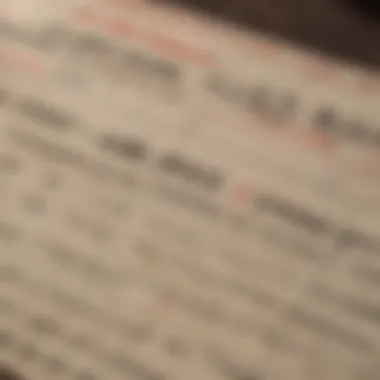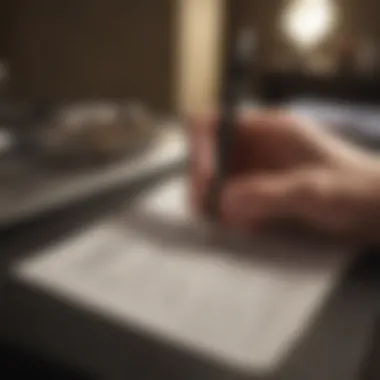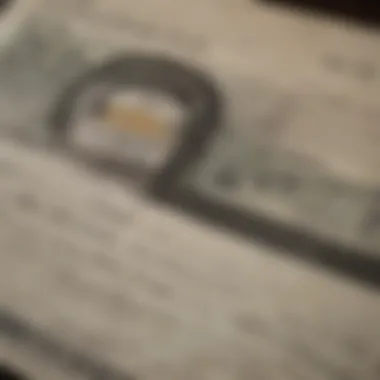How to Cash an Old Check: A Comprehensive Guide


Intro
Cashing an old check can seem like a daunting task, especially if you are uncertain about the process. Knowing the validity period of checks and potential hurdles you may face is crucial. This piece will help you understand how to approach the cashing of an old check with efficiency. Here, we will highlight key points of the subject and give thorough perspectives for anyone involved in such transactions.
Understanding Validity Period of Checks
Checks generally have a specified timeframe known as the stale date. A check can be considered stale after six months; thus, many banks are hesitant to cash or deposit these checks. Understanding how checks are viewed by banks within this timeframe enables individuals to strategize when to approach the bank for cashing.
Possible Obstacles When Cashing An Old Check
The hurdles often include:
- Bank Policies: Each bank has its own policy regarding whether they will cash or deposit old checks. Some may refuse outright.
- Payee Limitations: If the name on the check is not the same as the one presenting it, cashing might pose an additional challenge.
- Issuer’s Bank: Checks issued by banks that have since merged or closed might add to the difficulty.
A good approach would be to work directly with the issuer’s bank or check for their contact information using resources like Wikipedia's List of Banks in the US.
Steps to Cash An Old Check Effectively
- Confirm Validity: Reach out to the bank that issued the check to verify if they accept it.
- Gather Documentation: Bring Identification such as a driver’s license and any relevant bank details.
- Go to Customer Service: It might be beneficial to speak with someone directly rather than using a simpler deposit or automatic service.
Always be prepared with extra documentation as it might ease your verification.
Understanding Bank Regulations Regarding Old Checks
Banks operate under regulations established by financial governing bodies. The Uniform Commercial Code, which governs negotiable instruments such as checks in the U.S., stipulates general rules surrounding the cashing process for both parties. Familiarity with these regulations aids in navigating the intricacies which might otherwise hinder your goals.
To summarize, knowing the ins and outs of cashing an old check is integral to achieving a successful transaction. Understanding validity, potential challenges, and bank regulations supports individuals in making educated decisions.
Understanding the Nature of Old Checks
Understanding the nature of old checks is vital for anyone looking to cash them. There are several important factors involved, which can significantly affect the process. Knowing how checks are classified, what defines their validity, and the legal implications surrounding them prepares individuals for successful cashing attempts. It also aids in decision-making for managing finances suitably.
Defining an Old Check
An old check is typically defined as any check that has passed a specified time period since its issue date. While the exact duration can vary, these checks are frequently recognized by both financial institutions and beneficiaries as potentially outdated or stale. Generally, a check can be classified as old if it has not been cashed within six months of being issued. Understanding this definition helps individuals identify if their check can still be cashed.
Typical Validity Period of Checks
The most common validity period of checks hinges on the rules established by various financial institutions. Most checks remain valid for six months, thereafter becoming stale. However, some issuers may accept checks older than this as long as they agree to cash them. It is essential to consult with the bank or check issuer for specific guidelines. Negotiable instruments, defined by the UCC (Uniform Commercial Code), typically uphold this rule. When one is aware of this common practice, they can anticipate issues they may face with their checks.
Legal Considerations Surrounding Old Checks
There are notable legal consideration one must keep in mind regarding old checks. Banks and kiosks have certain discretion based on their policies. They may have the right to refuse to cash a check older than the typical six-month period due to concerns about the availability of funds or potential fraud. Additionally, if the check's issuer's financial status changes over time, such as account closure or funds inadequacy, individuals risk not receiving their money. Moreover, different states may impose additional rules for cashing checks, so it is wise to familiarize oneself with relevant regulations.
Informed action can prevent unnecessary losses and make cashing old checks a smoother process.
Evaluating the Check's Validity
Evaluating the validity of a check is a crucial step in the process of cashing old checks. This evaluation helps individuals determine whether the check they hold is still negotiable. Factors such as the issue date, the type of check, and its likelihood of being stale can significantly impact how and where the check can be cashed. By grasping the various aspects of evaluating check validity, individuals can make informed financial decisions, potentially saving both time and effort.


Date on the Check
The date printed on a check serves an essential role in determining its validity. Most banks and check-cashing outlets consider checks to be valid for a limited period, usually ranging from six months to one year after their issue date. A check that is older than this range can be labeled as
Where to Cash an Old Check
Cashing an old check can often feel perplexing. Understanding where to undertake this process is crucial. The choice of location significantly influences the outcome and efficiency of cashing endeavors. Let’s explore the options available and the considerations attached to each.
Banks and Credit Unions
Many individuals regard banks as traditional havens for cashing checks. This option generally offers a high degree of reliability and professionalism. Banks typically have specific policies regarding old checks that can vary greatly from one institution to another.
Here are some points to consider when using banks or credit unions:
- Account holder status: Most banks will only cash old checks for customers who hold accounts there. Non-members might face difficulties.
- Old check policies: These generally align with the institution’s stance toward stale checks. For instance, some banks might cash a check as long as it is within a specified period, perhaps ranging from three to six months.
- Added fees: Be prepared for potential fees if you're cashing a check without an active account.
To get started, simply visit your local branch with sufficient identification and the old check in question. Additionally, check the bank's website beforehand for any notes on their check-cashing policies.
Check-Cashing Outlets
Check-cashing outlets present another viable option. These establishments exist primarily to handle checks, including old ones, although their practices come with merits and drawbacks. Speaking to someone at the front desk may help grasp how they deal with aged checks.
Key data about check-cashing outlets includes:
- Higher fees: Be informed that most of these places charge much higher fees compared to banks. Always calculate the cost versus the money you will receive.
- Less thorough verification: They may accept various types of checks that banks refuse. However, this wanted service comes at a price. Always ensure to select a reputable outlet to avoid potential scams.
Ultimately, these places're less formal and maneuvers around typical bank restrictions, thus are best suited for immediate financial needs with knowledge of fees upfront.
Retail Locations
Certain retail locations, specifically large retail chains, also offer check-cashing services. This option is often more convenient as it may not require a trip to a bank or a specialized outlet, allowing for other shopping trips.
Consider key factors when using retail establishments:
- Express services: Many chains have instant check-cashing counters, making it likely you won’t need to wait long. Efficiency is a valued trait here.
- Limit on check value: Retailers typically have limits on the amount they will cash, so it’s wise to verify how much you can withdraw.
- Alignment with store policies: Ensure you are aware of specific store policies. Each chain handles checks discreetly, playing by their rules, and operation hours can often be more accommodating than banks.
Using any of these methods requires thorough checking on policies surrounding old checks in each specific context. This knowledge will direct you to your most effective cashing option.
Steps to Cashing an Old Check
Cashing an old check involves multiple steps that can determine whether the check will ultimtely be accepted or rejected. Understanding these steps is crucial in order to avoid potential pitfalls and effectively manage any financial risk. Each action you take in the process matters because they each aid in facilitating or hindering the cashing entire process. These steps include gathering all necessary documentation, endorsing the check properly, and knowing how to present it for cashing. This guidance is essential for those navigating through them for the first time.
Gather Necessary Documentation
Before attempting to cash an old check, it’s important to collect the documentation you might need. The first relevant document is the check itself, which needs to be intact and preferably free from any damage. Next, identification is often required. Institutions usually demand a government-issued ID. Suitable examples of identification include a passport, driver's license, or even possession card. In addition, any other paperwork that may clarify the origin of the wild check can be beneficial. This might consist of account statements or correspondence that supports the reason for cashing such an old instrument.
Endorsing the Check
Endorsement is the process of signing the back of the check. When endorsing an old check, ensure that the signature matches the name printed on the front. It is critical to perform this action properly, as mistakes can render the check useless regardless of its validity period. Sometimes, stipulations may be enforced on the endorsement. For instance, if the check is made out to you, but you want to transfer it to another party, ensure you write 'Pay to the order of New Party’s Name' underneath your signature. This can open pathways for cashing the check, although not all banks or cashing facilities will permit this.
Presenting the Check for Cashing


The final step involves presenting the old check at the appropriate institution. If you visit a bank or credit union, make sure to arrive during regular business hours at an accepted location for the issuer of your check. When handing the check to a bank teller, it is useful to clarify the date and purpose of the transaction clearly. This interaction will aid the staff in understanding that the check is legitimate and possibly worth cashing. If you opt for cashing via check-cashing outlet, determine their policies regarding old checks prior to your visit—it is vital to know their acceptance criteria.
Note: Failure to present the documentation and duly signed check can lead to cache refusal altogether. No institution will be comfortable with accepting paperwork that has not been properly vetted.
Potential Challenges in Cashing Old Checks
Cashing old checks can appear straightforward, but nuances become apparent upon closer inspection. Several challenges may arise during this process, making it crucial to understand them fully. This will help individuals prepare accordingly and mitigateany unexpected issues that may surface. Awareness of these challenges can assist bank account holders to make informed choices, especially when a financial transaction involves checks that have fallen out of date.
Insufficient Funds in the Issuer's Account
One of the most critical potential challenges when cashing an old check involves insufficient funds in the issuer's account. If the person or organization that issued the check does not have enough money in their account, the check will bounce. This puts anyone cashing the check at risk of not receiving their money. Checks can remain valid for years, but things may change behind the scenes over time. Understanding these risks is the first step to navigating a stable transaction.
To avoid this situation, experts recommend confirming with the check issuer before independently cashing it. Verifying the status of the account can provide reassurance about its solvency. It remains wise to have multiple forms of payment available, should the need to switch arises in real time.
Refusal by Financial Institutions
Another important concern is the potential for refusal by financial institutions. Each bank or credit union possesses different polices around cashing checks, particularly those that have exceeded validity periods. In most cases, banks clearly define the time limits on their checks, and cashiers are trained to enforce these policies strictly.
Refusal might come not only from the fact that the check is old; issues related to check type, verification limits or even issuer reputation can affect acceptance. Understanding every bank’s policy is critical. Those attempting to cash should try to choose institutions familiar with stale checks. Moreover, develop good relationships with bank officers, as this can ease the process.
Fraud Concerns and Verification Issues
Cashing old checks can also raise red flags concerning fraud. With outdated checks, banks might conduct thorough verifications to ascertain their authenticity. This includes checking issuer name and contact details with multiple sources. Any mismatches can lead to refusal of the transaction, eroding trust with potential penalties.
Reporting suspicious checks can serve a greater purpose. If potential fraud is identified, your legitimate check could draw support from solid evidence if funds need earlier withdrawal.
Alternatives to Cashing an Old Check
Understanding alternatives to cashing an old check is crucial. While the standard option is attempting to cash the document at a financial institution, this can be problematic due to various factors. For those with old checks, the alternatives allow for better management of funds while reducing potential issues linked with old paperwork. These alternatives can strengthen your financial standing and optimize available resources.
Depositing the Check
Depositing the check remains a feasible option, more often than not. Banks usually accept checks that are out-of-date for deposit, but polices can differ. When a deposited check goes through, the amount transfers into your bank account. Key considerations include the bank’s rules, duration of the check, and your account status. If any withholding may happen, be aware that funds might not be available immediately. You should check with your bank to understand their standards in detail and the timeframe you can expect funds to clear.
- Confirm with your bank about outdated check policy.
- Ensure you have sufficient identification before attempting to deposit.
- Record your deposit just in case it does not process correctly.
Depositing can take fewer steps than cashing directly, offering a streamlined process
Requesting a Reissue of the Check
If the check is most likely invalid for cashing anywhere, you can consider requesting a reissue. This step is important if the organization or person issued the check is reachable. Generally, it involves contacting the issuer's office and explaining the situation. Be prepared to provide specific information about the original check; details help expedite the process. A reissued check provides a fresh option catered to current financial contexts.
- Contact the issuer directly about the situation.
- You may require identification and proof of date.
- Consider asking about processing time for the reissue.
In making this request, it’s wise not to delay. This option is time-efficient compared to sorting the initial one.
Converting the Check to Other Payment Methods
Converting the check into other payment methods may provide a practical avenue if cashing or depositing does not present feasible results. Various methods exist in the digital age. Methods like electronic transfers or payment systems can revolutionize transactions whilst ensuring you do not run into issues associated with stale drafts.


- You may opt for direct deposit if possible.
- Some individuals even use apps for peer-to-peer transfers where applicable.
- Cashing options through services might allow conversion as well.
Ultimately, being open to converting options provides financial mobility and helps maintain awareness of circumscribed days linked to old payments. Be prepared for a slight learning curve if you're unfamiliar with processes for electronic transactions or alternative forms of cashing.
"Exploring these alternatives can provide you with better control over your finances and avoid dodging potential complications from old checks."
A balanced approach using these alternatives provides a safer environment that not only supports financial transactions but also orients optimally towards constructive financial health.
Impact on Credit and Financial Standing
Cashing an old check can impact not just one's immediate financial situation but also credit scores and future financial transactions. Understanding the implications is crucial for individuals who are careful with their finances and want to maintain or improve their credit standing.
The significance of maximizing the value of your finances often lies in your choice of cashing old checks. A staled check might create doubts regarding credit history. Financial institutions consider a history of returned checks as red flags, increasing the probability of tighter lending agreements or higher interest rates for future loans.
It is essential to recognize how seemingly small actions regarding checks can snowball into more significant financial discussions.
Cashing Old Checks and Credit Reports
When cashing an old check, one must consider its potential impact on credit reports. The act itself might not directly affect the credit score unless the check bounces due to insufficient funds in the issuer's account. If this happens, it may result in a negative mark on your credit report. Moreover, repeated failures to cash checks can contribute to perceived financial instability. Here are some key points to keep in mind:
- Bounced Checks: If a check bounces, it might engage a collections agency, which can tangibly damage your credit report.
- Checking Account Health: Frequent negative transactions in your account can concern lenders, hinting at potential risks.
Understanding the Penalties and Fees
Cashing old checks often leads to penalties or fees charged by financial institutions. It is crucial to comprehend these charges both as a financial responsibility and as a means of protecting one's credit. Financial institutions regularly impose fees for processing outdated checks, especially if the checks are personal and target irregular conditions like insufficient funds.
Common penalty fees include:
- Processing Fees: These may occur when a check is processed beyond its validity period.
- Bounced Check Fees: If the check does not clear, this may involve additional charges.
Avoiding these penalties is largely about knowing when to cash a check and selecting the right financial entity to work with. Engaging organizations with minimal fee policies can mitigate these costs effectively.
Planning for Future Financial Transactions
Individuals need a solid strategy for future transactions involving checks and finances to avoid unwanted consequences. Here are some planning techniques:
- Regular Review of Finances: Investors must frequently assess their checks, bank statements, and overall financial condition.
- Stay Informed: Understanding each minimum requirements for cashing as checks age is paramount for those looking to maximize returns.
- Consider Alternatives: Sometimes it is more beneficial to request a reissued check or consider direct deposits if feasible.
Ending
Cashing old checks is more than just a simple transaction; it impacts an individual’s financial standing and must be approached with care. In the contemporary financial environment, understanding the process of cashing these checks is essential. It serves as a reminder that even outdated financial instruments can possess value if handled correctly.
Individuals who find themselves in a situation with old checks need to consider several factors. First and foremost, the validity of the check must be assessed. Knowing the specific date and type of check can determine whether it is eligible for cashing. Banks and financial institutions often operate under strict policies surrounding stale checks, contributing to confusion and possibly leading to potential stress for the holder.
Considering alternatives, such as reissuing a check or opting to deposit instead of cashing, also deserves attention. These options can mitigate any negative financial repercussions. Understanding specific bank policies, and the role they play in the intricacies of cashing checks, is equally important.
As a final point, being aware of how cashing an old check may correlate to one’s personal credit can shine a light on how small actions impact broader financial health. It’s prudent to remain informed and vigilant about these transactions, ensuring that one maintains byllance.
In summary, cashing old checks can be successfully navigated by educating oneself. With the right knowledge, one can avoid pitfalls while optimizing their financial transactions.
Final Thoughts on Cashing Old Checks
Cashing an old check requires an analytical approach. It is not just about emotion; rather, practicality is essential. With proper understanding, the holder can maximize their outcome from what would otherwise seem like a neglected piece of paper.
Navigating this process effectively involves recognizing the limits that may arise owing to the check’s duration and type. Engaging with the right financial institutions is crucial, as their policies greatly affect the outcome. Always act with caution; if in doubt, seek assistance from a professional or financial advisor.
In this way, one can move through the steps smoothly while ensuring that their financial interests are kept secure. Focus on facts rather than assumptions, and every experience can become a valuable lesson in financial management.



